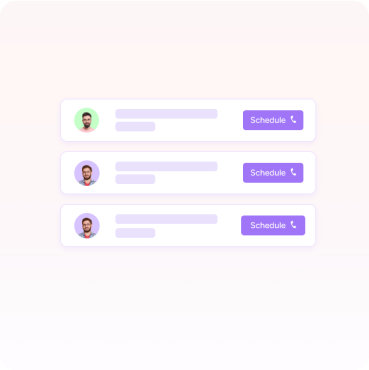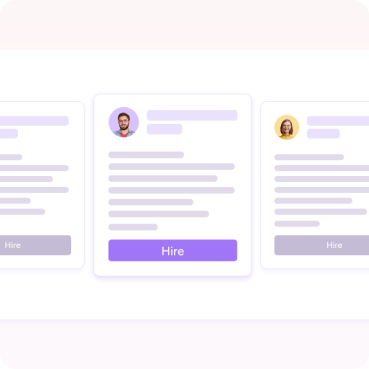Regular hiring
High RiskHire AWS amplify developers of Silicon Valley caliber
Hire pre-vetted full time remote AWS amplify developers from India. Hire now and build your dream engineering team with Hyno
Join 4,000+ companies already growing








Our Top Remote Developers
Hyno conducts rigorous testing and carefully vets the developers who are fueled by passion and skill sets. Hence, our developer community is the foundation for innovation and collaboration, bringing ideas and projects to fruition.
OUR STANDARDS
Hyno vs. Your regular recruitment process.
Find a risk-free, pre-interviewed, high-quality developer who is remote-ready in less than 2 weeks at 40% less cost.
Parameters
Choose the right for your firm.Time
Fees
Quality
Pre Screening
Remote readiness check
Termination
Failure rate
1 - 4 Months
> $1000
High
Low
Freelancing
High Risk1 - 2 Months
No fee
No
Very high
 Low Risk
Low Risk
0 - 15 Days
No fee
No
Very low
Pricing Starts from $35/hr
Accomplishing everything in just 3 steps
Our technical manager aligns the required skillset and tech stack with our talent pool to help you find the best fit.

Shortlisting candidates
Precise Hiring: Understanding, Gathering, and Shortlisting nittygritty.
-
 We start by thoroughly understanding your unique needs and specifications.
We start by thoroughly understanding your unique needs and specifications.
-
 check markWe
align the developer details with company goals. This way, we tailor the candidate
selection to seamlessly integrate with the organization’s vision and goals.
check markWe
align the developer details with company goals. This way, we tailor the candidate
selection to seamlessly integrate with the organization’s vision and goals.


Scheduling an Interview
Effortless talent selection: Finding your perfect match
-
 We connect you with the chosen candidates to ensure a personalized experience.
We connect you with the chosen candidates to ensure a personalized experience.
-
 Our rigorous
selection process guarantees that you find candidates who align seamlessly with your
requirements.
Our rigorous
selection process guarantees that you find candidates who align seamlessly with your
requirements.


Onboarding the talent
Streamlined onboarding for peak performance.
-
 The selected/qualified talent integrates smoothly through structured onboarding to
quickly adapt to projects, processes, and team dynamics.
The selected/qualified talent integrates smoothly through structured onboarding to
quickly adapt to projects, processes, and team dynamics.
-
 We go beyond
integration to offer ongoing support for a seamless transition to ensure that the
new talent exceeds your expectations.
We go beyond
integration to offer ongoing support for a seamless transition to ensure that the
new talent exceeds your expectations.


Read hiring guide
A one-stop shop to hiring the right AWS amplify Developer
How to hire a AWS amplify developer? Skills to look for, interview questions, and more
Hiring a dedicated developer for your business can
be a cumbersome task. As many companies are competing to hire top AWS amplify
developer, so finding a good developer is not as easy as it may seem.
We're here to assist all employers who choose to hire AWS amplify developer on their
own. Recruiting a developer on your own requires a fair amount of software
development experience in general. However, if you're a non-technical manager
interested in learning more about how to hire a AWS amplify developer, we've put up
an excellent resource for you.
Things to check Key Skills Required for a AWS amplify Developer?
The following are the key skills that a developer should possess to become proficient in AWS amplify :
1. AWS Services: The developer should have a good understanding of AWS services such as EC2, S3, Lambda, API Gateway, DynamoDB, and more. They should be familiar with the AWS console and AWS CLI.
2. JavaScript: AWS Amplify is built using JavaScript, so the developer should have a strong understanding of this programming language. They should be able to write clean and efficient code using JavaScript and its frameworks such as React and Angular.
3. Serverless Architecture: AWS Amplify is built on a serverless architecture, so the developer should be familiar with serverless computing concepts and practices.
4. RESTful API design: The developer should have experience designing and building RESTful APIs. They should be familiar with API Gateway and Lambda functions to create and manage APIs.
5. Authentication and Authorization: The developer should be familiar with AWS Cognito and its integration with AWS Amplify for user authentication and authorization.
6. Git: The developer should be comfortable with Git for version control, collaboration, and deployment.
7. Testing: The developer should be familiar with testing frameworks such as Jest and Enzyme for unit testing and end-to-end testing.
8. Deployment: The developer should be familiar with AWS Amplify CLI and its deployment processes to deploy code to various environments.
9. Troubleshooting: The developer should be able to troubleshoot issues and errors that arise during development and deployment.
10. Continuous Integration/Continuous Deployment (CI/CD): The developer should have experience with CI/CD pipelines using tools such as AWS CodePipeline, CodeBuild, and CodeDeploy to automate the deployment process.
Ideal Hiring Process for AWS amplify Developer
1. Determine the job requirements: Define the job requirements, including the technical skills, level of experience, and other qualifications you are looking for in a remote AWS Amplify developer.
2. Post the job listing: Post the job listing on relevant job boards, including remote job boards, and social media platforms. Be sure to include all job requirements and qualifications, as well as any necessary information about your company and the project.
3. Review resumes and applications: Review the resumes and applications you receive from potential candidates. Narrow down your list to candidates who meet your requirements.
4. Conduct initial interviews: Conduct initial interviews with candidates via phone or video chat. Ask technical questions related to AWS Amplify development to assess their knowledge and experience.
5. Assign a technical test: After initial interviews, assign a technical test to assess the candidates' skills and experience in developing AWS Amplify applications.
6. Conduct follow-up interviews: After reviewing the results of the technical test, conduct follow-up interviews with the top candidates to discuss their work and further assess their fit for the job.
7. Check references: Check references for the final candidates to ensure they have the necessary skills and experience.
8. Offer the job: Once you have identified the best candidate, make a job offer that includes the job description, salary, benefits, and any other relevant information.
9. Onboarding: After hiring the remote AWS Amplify developer, ensure they are onboarded properly. Provide them with all necessary resources, including access to your development environment and project documentation.
10. Communication and Collaboration: Regular communication and collaboration is essential when working with remote developers. Ensure that you establish clear lines of communication and set up regular check-ins to monitor progress and address any issues.
Important Interview questions to ask to Hire a AWS Amplify Developer
What is AWS Amplify, and how does it differ from other AWS services?
AWS Amplify is a set of development tools and services that allows developers to build secure and scalable cloud-powered mobile and web applications. It differs from other AWS services in that it is specifically designed to simplify the development process by providing a unified interface and a set of pre-built components and libraries.
How familiar are you with serverless computing, and how have you used it in your past projects?
I am very familiar with serverless computing and have used it extensively in my past projects. I have experience working with AWS Lambda, API Gateway, and DynamoDB to build serverless applications that are scalable, reliable, and cost-effective.
How would you ensure the security of an AWS Amplify application, and what are some best practices to follow?
I would follow the AWS security best practices, including encrypting data in transit and at rest, implementing access controls, monitoring for security events, and using AWS Identity and Access Management (IAM) for authentication and authorization. Additionally, I would ensure that the application code is free from common security vulnerabilities such as injection attacks, XSS, and CSRF.
Have you worked with AWS Cognito, and how would you integrate it with an AWS Amplify application?
Yes, I have worked with AWS Cognito, and I would integrate it with an AWS Amplify application by configuring the Amplify CLI to use Cognito for user authentication and authorization. I would also configure the application to use the Cognito API to manage user pools, user authentication, and authorization.
How do you handle version control in your projects, and what version control systems have you used?
I use Git for version control in my projects and have used GitHub and Bitbucket for remote repositories. I follow the best practices for Git branching and merging, including creating feature branches, merging changes, and resolving conflicts.
Have you worked with AWS AppSync, and how would you use it to build real-time data-driven applications?
Yes, I have worked with AWS AppSync, and I would use it to build real-time data-driven applications by configuring the AppSync API to connect to data sources such as DynamoDB or Elasticsearch. I would then use the Amplify CLI to generate GraphQL queries and mutations and configure the application to use subscription APIs to receive real-time data updates.
How do you approach testing in your projects, and what testing frameworks have you used?
I approach testing in my projects by using automated unit testing and end-to-end testing. I have used testing frameworks such as Jest and Enzyme for unit testing and tools such as Cypress and Selenium for end-to-end testing.
What are your preferred development tools and why?
My preferred development tools are Visual Studio Code, Git, and the AWS CLI. I prefer Visual Studio Code because it is lightweight, customizable, and has a rich set of extensions for various languages and frameworks. Git is my preferred version control system because it is widely used and has excellent branching and merging capabilities. Finally, the AWS CLI is my preferred command-line tool for managing AWS resources because it is easy to use and integrates well with other development tools.
Have you worked with AWS Amplify Console, and how would you use it to deploy an AWS Amplify application?
Yes, I have worked with AWS Amplify Console, and I would use it to deploy an AWS Amplify application by configuring the Amplify CLI to use the Amplify Console for deployment. I would then configure the application to use a custom domain, SSL certificate, and other settings before deploying it to the production
Job Description Template for AWS Amplify Developer
Location: [Insert Location]
Job Title: AWS amplify Developer
Position Type: Full-Time
Salary: [Insert Salary Range]
We are looking for an experienced AWS Amplify Developer to join our team. As an AWS Amplify Developer, you will be responsible for developing and maintaining cloud-powered mobile and web applications using AWS Amplify and other AWS services. You will work closely with other developers, designers, and stakeholders to deliver high-quality software solutions.
Key Responsibilities:
- Design, develop, and maintain cloud-powered mobile and web applications using AWS Amplify and other AWS services
- Write clean, maintainable, and scalable code using best practices and design patterns
- Collaborate with other developers, designers, and stakeholders to understand requirements and design solutions
- Perform code reviews and ensure that code meets quality and security standards
- Optimize application performance and scalability by using AWS services such as Lambda, API Gateway, and DynamoDB
- Configure and manage AWS services such as Cognito, AppSync, and Amplify Console
- Write automated tests and ensure high test coverage
- Stay up-to-date with the latest AWS technologies and best practices
- Document code and processes to ensure knowledge transfer and maintainability
Requirements:
- Bachelor's degree in Computer Science or a related field
- At least 3 years of experience in software development, with a focus on AWS services and Amplify
- Experience developing cloud-powered mobile and web applications using AWS Amplify and other AWS services
- Strong proficiency in JavaScript, TypeScript, React, and GraphQL
- Familiarity with serverless computing and experience using AWS Lambda, API Gateway, and DynamoDB
- Experience configuring and managing AWS services such as Cognito, AppSync, and Amplify Console
- Knowledge of software development best practices and design patterns
- Experience writing automated tests and ensuring high test coverage
- Ability to work independently and in a team environment
- Strong problem-solving and communication skills
Preferred qualifications:
- AWS Certified Developer - Associate or Professional certification
- Experience with CI/CD pipelines and deployment automation
- Experience working in an Agile/Scrum environment
- Familiarity with other cloud platforms such as Azure or Google Cloud Platform
If you are an experienced AWS amplify Developer who enjoys working in a fast-paced, challenging environment, we would love to hear from you. Please submit your resume and cover letter for consideration.